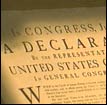
 |
 Oral History
Research Guide Oral History
Research Guide
 What is an Oral History?An Oral history is the systematic collection of living people's testimony about their own experiences. Oral historians attempt to verify their findings, analyze them, and place them in an accurate historical context. An Oral Historian searches for evidence, using primary documents, such as letters, diaries, court documents, objects used by the people being studied, and buildings where the people lived, and secondary sources to support their findings. Historians go to primary sources in the search for evidence to answer questions about what happened in the past and why. What is the difference between a Primary Source and a Secondary Source? CLICK HERE to find out. When working with primary sources, answering a series of basic questions can help you draw more accurate conclusions. For example: When gathering evidence from a primary source, answer these basic questions. 1. What is it? What Is The Meaning of This Primary Source? 1. Why was this document/object written or made? Primary Source Evaluation Forms Oral History Research Process I. Selecting a Topic Chronology Books are an excellent source of potential oral history topic ideas. To locate books of chronology, go into the RHS Catalog and type in Modern History AND chronology. The library catalog also has a number of examples of written oral histories. To locate an example of an oral history, click on the Oral History Resource List. American Decades provides a list of important events by Subject Area by Decade. Subject areas include: Arts, Business & Economy, Education, Fashion, Government & Politics, Law & Justice, Lifetyles, Media, Medicine and Health, Religion, Science and Technology and Sports. History Behind the Headlines presents in-depth information on conflicts appearing in today's headlines. In Context Databases as Topic Sources
II. Locating Historical Background Information for your Oral History topic. Most topics are usually too broad and will need to be narrowed down. To get ideas on how to narrow the focus of a topic, it is important to obtain background information about your topic. The perfect source for background information on any topic is a Subject Encyclopedia. A book on your topic also will provide you background information. Check out the RHS Catalog to determine if there is a book on your topic.
III. Narrowing the Focus of your Topic Most research projects begin with a general topic, too broad to cover in accordance with project guidelines. For example:
After reading background information on the Antiwar Movement, I identified one aspect of the Movement that could be used as an Oral History Topic Choice. There was a section in the article discussing Conscientious Objectors. So the Topic has been narrowed down from the Antiwar Movement to just Conscientious Objection. This topic can be narrowed down even further by applying one or more of the following strategies in helping to Narrow the focus of the Oral History Report. Click Here to see an example.
IV. Formulating a Research Question A good way to start your research is to state your topic as a question using WHAT, WHY or HOW. This will help you clarify your thoughts and to focus on specific aspects of your topic. Taking the information you used to Narrow the Focus of Your Oral History Topic, develop three different Research Questions, using What, Why and How?
V. Identifying Keywords from the Research Question Using the Research Question you developed, underline or circle the keywords or key concepts from your question that you can use to research your topic. Learning to Talk to Online Research Databases
VI. Researching other Primary Resources Several of the Library's Research Databases provided primary sources. Depending on your topic, you may find other supporting primary documents for your Oral History topic. These may include: Personal Narratives, Speeches, Statistics, government documents, audio podcasts or video clips. Milestone Documents in American History MasterFile Premier - primary sources include Vital Speeches and documents from the American Reference Library. ProQuest Newwstand - Newspapers are one of the premier resources to obtain both primary and secondary sources of information. Document Analysis Worksheets from the National Archives. VII. Researching Scholarly Journals and Popular Magazines. VIII. Oral History Websites Making Sense of Oral History - Oral history interviews provide a unique look into the past from the perspective of one person. Discover how to use oral histories as primary source historical evidence. Oral history can refer to formal accounts or informal conversations. It can include recorded interviews and printed stories. Throughout history, recollections have played a role in learning about the past. Interviews have been essential to recording that history. History Detectives - Information on why the personal interview is so important to the study of oral history is part of the listing of Detective Techniques on this PBS History Detectives series. Oral History Interviewing Guide - allows you to document your own community or family members. The booklet offers guidelines to help you conduct interviews, offer you sample questions, and are easily adaptable. There are even examples of how to use your findings for a presentation. Oral History Handout - To gain a better understanding of a particular society, you might interview a person or a group. First, you need to shape the questions. Next, you need to conduct the interview. Then, you need to take the interviewee's answers and turn them into an essay. From the University of North Carolina. |
|||||||||||||||
| Library Home Page Updated 3/20/14 |
|
Rosemount High School
3335 142nd St. W.
Rosemount, MN 55068
Ph: 651.423.7501 |